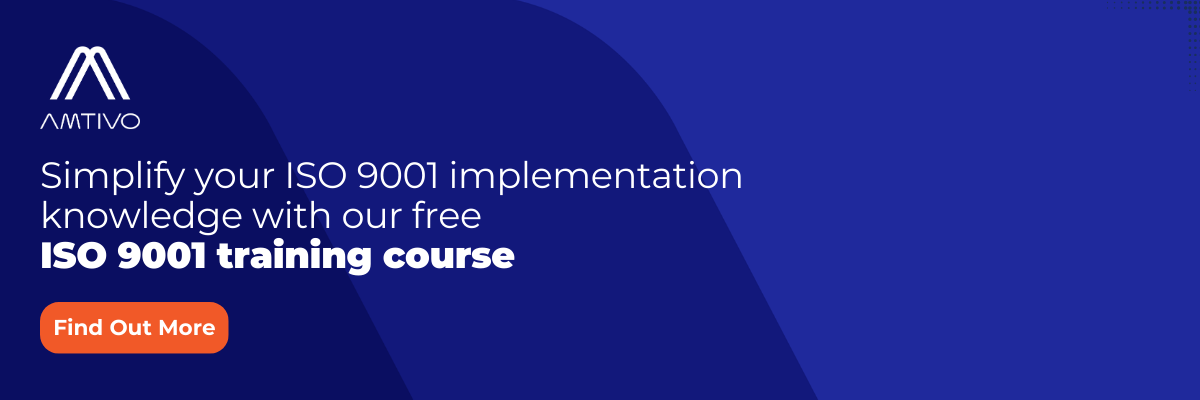If you’re unsure how to achieve ISO 9001 certification for your organization, we have the answers.
We work with thousands of organizations each year to help them gain ISO 9001 certification. Some businesses know little about ISO 9001 but know they need it. Others have researched the standard but have questions about its implementation.
Here, we look at some of the most frequently asked questions about how to get ISO 9001 certification.
Who Needs ISO 9001 Certification?
ISO 9001 certification is useful for any organization regardless of its size or the industries it works in.
It is particularly valuable for organizations who want to:
-
Increase sales and profit margins
-
Increase customer satisfaction
-
Streamline operations
-
Gain a competitive advantage
-
Improve their Quality Management System (QMS)
Companies want to gain certification to:
-
Demonstrate their commitment to quality
-
Meet customer and regulatory requirements
-
Qualify for contracts that require ISO certification
Learn more about the benefits of ISO 9001 certification.
How To Get ISO 9001 Accreditation?
Many people confuse the terms certification and accreditation.
We provide organizations with ISO 9001 certification.
As a certification body, we maintain independent accreditation to demonstrate our competence and capability to assess your conformity to specific standards.
We are accredited by the ANSI National Accreditation Board (ANAB)—a non-governmental organization that provides accreditation services and training to public- and private-sector organizations, serving the global marketplace. ANAB is the largest accreditation body in North America and provides services in more than 75 countries.
Just as your certification will prove your competence to clients, our accreditation means you can trust us to confidently issue your certification and thoroughly conduct your audits.
How to Get ISO 9001 Certification
To get ISO 9001 certification, you must show that your QMS meets the standard’s requirements. We offer tools to help with this.
The certification process starts with a Stage 1 assessment conducted by one of our expert auditors. They’ll review your policies and procedures to find any gaps in your QMS that you need to fix before moving to Stage 2.
You’ll receive a detailed report and gap analysis to identify what’s needed for certification. Use this report, along with our tools, to make necessary changes.
Our auditor will then return for your Stage 2 assessment to check everything is in place, and any nonconformities or gaps have been addressed.
If everything checks out, you’ll receive your ISO 9001 certification after an independent review by our compliance team.
 |
What Organizations Need to Do in the Certification Process
1. Prepare for Certification
Before applying for ISO 9001 certification, it’s important that you understand the standard’s requirements. The official ISO 9001 documents from the International Organization for Standardization (ISO) can help you learn about the standard’s structure and key ideas.
Your organization’s senior management must be committed to getting certified. Their support is essential.
Depending on your organization’s size and complexity, you might need a team from different departments to lead the certification process. Smaller businesses might choose one or two people for this task. You need a detailed plan with your quality goals, steps to reach them, and the resources and timeline needed.
2. Gather Documentation
Proper documentation is crucial for your QMS. It standardizes operations and serves as a guide for maintaining quality.
You’ll need to outline your Quality Policy, define the scope of your QMS, set quality goals, and clarify team roles, procedures, and risk assessments.
3. Put Your QMS Into Action
Successful certification means integrating quality management practices into everyday operations.
As you roll out your QMS across your organization, ensure that all employees understand and follow the new processes. Provide the necessary resources and training employees need.
4. Complete an Internal Audit
Conduct internal audits regularly to assess the effectiveness of your QMS. Create an audit schedule and checklist that covers everything thoroughly.
Before the final certification audit, consider using a qualified in-house auditor or an external consultant to do a gap analysis. This helps find areas where your QMS might not meet ISO 9001 standards. Use this feedback to make the necessary changes. This step is crucial for understanding what needs to be refined before your formal audit.
5. Complete the Certification Process
After addressing any gaps, schedule the official audit with your chosen certification body.
Auditors will thoroughly check your QMS to ensure it meets ISO 9001 standards. Prepare for your audit by reviewing documents and ensuring everything runs smoothly.
Passing this audit and achieving certification shows your commitment to quality management and boosts your reputation with customers and stakeholders.
How Do I Apply for ISO 9001 Certification?
It’s easy to apply for ISO 9001 certification—contact us for a free no-obligation quote.
We’ll provide you with all the information you need about the next steps so that achieving ISO 9001 certification is as easy as possible for you and your organization.
How Long Does It Take to Get ISO 9001 Certification?
The time to get ISO 9001 certification varies based on a few things:
-
The size of your organization
-
How much you already have in place
-
The resources you have available to work on your management system
The certification process typically takes 3-6 months, although some clients complete it in less than two weeks, while others take longer. Each business is different.
It can be helpful to have a designated member of the team who takes responsibility for your certification. Preparing in advance can speed up the certification process, too.
How Hard Is It to Achieve ISO 9001 Certification?
The amount of work needed to set up an ISO 9001 Quality Management System depends on your organization’s size, complexity, and current system.
If you are already operating in business, you are likely to already have many in place, making the process simpler than you might think.
Your ISO 9001 assessment has two stages, but preparing in advance makes the assessment easier. Read the requirements of ISO 9001 and organize as much of the needed documentation as you can.
We also recommend completing our free ISO 9001 online training to familiarize yourself with the standard.
Don’t worry if you’re not able to do much preparation. Our auditor will identify any gaps in your existing policies and procedures in their report. They can guide you in addressing any issues with the tools and information they provide.
Do I Need an ISO 9001 Consultant?
You don’t need to hire a consultant. Our expert auditors will help you spot areas in your QMS that might need improvement before the final assessment. We’ll also provide documentation, templates, and tools to help you set up the necessary processes for ISO 9001 certification.
Most of our clients handle their management systems internally. However, if you have the budget and need more help than we can offer (due to ANAB rules, we can’t provide consulting), you might benefit from a consultant’s expertise.
We can give you a list of trusted ISO consultants who can support you during the certification process.
Does ISO 9001 Require Regular Assessment?
Yes. A commitment to continual improvement is one of the greatest strengths of ISO 9001.
Once you’ve achieved ISO 9001 certification, you will need to undergo audits by a certification body annually. This is to assess whether your QMS is still meeting the high standards of ISO 9001 and to help you identify any areas that might need improvement.
Your organization must undertake a recertification audit every three years to maintain certification.
Read our ISO 9001 guide for more information about the standard and achieving certification.
Get Started With ISO 9001 Certification
We can support your organization on its journey to realising the benefits of ISO 9001 certification. One of our expert auditors can perform the Stage 1 audit to identify any gaps in your current QMS that you must address before you can move on to the in-depth Stage 2 audit and achieve certification.
Get started on your ISO 9001 certification journey—get a quote or contact our team to discuss your needs.





